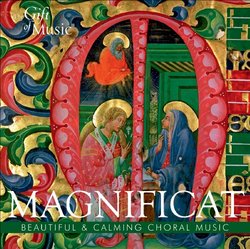| All Artists: Magdala Title: Magnificat Members Wishing: 0 Total Copies: 0 Label: The Gift of Music Original Release Date: 1/1/2009 Re-Release Date: 2/1/2009 Genre: Classical Style: Opera & Classical Vocal Number of Discs: 1 SwapaCD Credits: 1 UPC: 658592121629 |
Search - Magdala :: Magnificat
 | Magdala Magnificat Genre: Classical
This programme of beautiful and elaborate sixteenth-century choral music from across Europe was inspired by the music collection of a French ambassador to the court of Henry VIII. It features magnificent music by some of t... more » |
Larger Image |
CD Details
Synopsis
Product Description
This programme of beautiful and elaborate sixteenth-century choral music from across Europe was inspired by the music collection of a French ambassador to the court of Henry VIII. It features magnificent music by some of the greatest musical names of the age, recorded in Italy in a rich and resonant acoustic. Clemens non Papa was one of the most prolific composers of the early part of the sixteenth century, having produced a great number motets, Masses, and Magnificat settings. Clemens was particularly well known for his sacred music, and the majority of his compositions were published during his lifetime, as such, he enjoyed an enviable international reputation throughout Europe and England. Jean Richafort, another famous Netherlander, was employed for a time at the French royal court. Vincenzo Galilei mentions that he, with other musicians, came from France to Rome in 1513 at the time Pope Leo was elected; Richafort is also known to have travelled to Bologna in 1516 with the entourage of Francois I, during which time the same pope was greatly impressed with his ability. Jean L'Heritier was of Northern French origin and studied with the great Josquin des Prez. He is recorded as Maestro di cappella at S. Luigi dei Francesi in Rome in 1522, and later found a place in the service of the Cardinal de Vermont at Avignon. The quality of his work is attested to by his frequent appearances in published anthologies from 1519 onwards, and it is clear that his work was known and respected throughout Europe, even though he is little-known today. The Italian composers represented on this disc were well travelled. Francesco dell'Aiolle (Layolle) was born in Florence in 1492, and is unusual in that while many composers of the time aspired to Italy, dell'Aiolle migrated to France and spent much of the latter part of his career in Lyons. He seems to have moved quite freely among literary circles in both Italy and France, and is certainly one of the last unsung masters of the early sixteenth century. The Pater noster, where influence of the post-Josquin generation is evident, is notable in its simplicity and bold counterpoint with double suspensions and unexpected harmonic turns. Giachetto de Mantova, a pupil of Josquin, was better known, and some of his music even ended up in an English source of c.1541, thought to contain the repertoire performed at Magdalen College, Oxford. Dum vastos Adriae fluctus is a tribute motet to his master Josquin, in which, while travelling across the Adriatic Sea, Giachetto recalls the joys of his master's works; later in the work, no less that five of Josquin's motets are found imbedded in Giachetto's polyphony. English composers of the early sixteenth century, by comparison, absorbed little artistic influence beyond their shores, and developed their own 'insular' style of composition: here, as may be heard in the music of John Sheppard and Robert Fayrfax, sonority and grand textures take precedence over word-setting and imitative counterpoint. John Sheppard spent much of his working life in and around Oxford, and was Informator Choristarum at Magdalen College, Oxford in the 1540s, there is little evidence that he travelled outside of England. The great Robert Fayrfax, however, was known to have at least been in attendance in France at the Field of the Cloth of Gold in the summer of 1520, when Henry VIII and François I famously met for great festivities and music-making. Fayrfax was considered to be the 'prime musician of the nation' and his style typifies the zenith of English composition before the onslaught of the mid-sixteenth-century Reformations. Recorded in the church of San Andrea, Levanto, 30th June- 1st July 2005 by kind permission, with special thanks to Aldo Viviani and the Commune de Levanto
Similar CDs
| Brainchild One Word Genres: Alternative Rock, Pop, Rock Label: BrainchildJam | |
| Chita Rivera And Now I Swing Genres: Jazz, Pop Label: Yellow | |
| Bela B. Code B Genres: International Music, Pop Label: 101 DISTRIBUTION | |

 Track Listings (7) - Disc #1
Track Listings (7) - Disc #1

